July 2018: Olive Tree

Volume II/Issue 27/July 2018


From The Editorial Desk:
“For we are sojourners before thee, and strangers, as were all our fathers. Our days upon earth are as a shadow, and there is no stay.” (I Chronicles 29:15).
Let us look at the second half of verse fifteen.
"Our days upon earth are as a shadow, and there is no stay." (I Chronicles 29:15).
“No stay” “No abiding.” No hope to escape death for any person, young or old. See the truth of this statement as this year comes to the half way point. Think of the deaths some of the rich and famous this year.
Mickey Jones: February 7, 2018 (actor in all kinds of movies and drummer for Kenny Rogers and others.)
John Mahoney: February 4, 2018 (played the father of Frazier)
David Ogden Stiers: March 3, 2018 (known for Winchester in Mash)
Stephen William Hawking: March 14 2018 ( Do I have to explain who he was?)
Joe Jackson: June 27, 2018 (Father of Michael Jackson)
Billy Graham: February 21, 2018 (Evangelist)
Barbara Bush: April 17, 2018 (George Bush Sr. Wife)
Those are just a few famous people who died this year. You may be asking why am I thinking about such a morbid topic? Well this month is my birthday. I am starting to contemplate more and more each day my mortality. In September I will be ordained to the priesthood. It could be a new chapter in my life and it could also be the last chapter in my life. I just don't know. And by the way....neither do you! I am not in the best of health but I am not “knocking on heavens door either.....at least....I don't think I am. But the reality is we all die. Although the numbers fluctuate, the average deaths in one day as of the time this editorial was written was 153,424! One Day!!
“Our days upon earth are as a shadow, and there is no stay.”
These are sobering thoughts for us to think about. Very few people want to think about death. Death can come at any time, to a person of any age.
“Our days upon earth are as a shadow, and there is no stay.”
Even though most people don’t want to think about death, the Bible has a great deal to say about it.
The Bible says that all of us will die.
The Bible says, “as in Adam all die” (I Corinthians 15:22). The Bible says, “death passed upon all men” (Romans 5:12).
The Psalmist asked, “Who is the man that shall live, and not see death?” (Psalm 89:48).
And King Solomon answered,
“It is not in man's power to stop the spirit, neither hath he power in the day of death” (Ecclesiastes 8:8).
Even though we know that we are going to die, death always comes as a shock to us. I remember exactly where I was, and what I was doing, when I heard that my grandmother died. I remember exactly where I was, and what I was doing, when my father died. Each time I have heard this it has sent a shockwave through my body.
I have attended many other funerals. Each time, there is shock, and confusion, and sadness. You never get used to it. It always comes as a heavy blow. Job said, “Man born of a woman, living for a short time, is filled with many miseries. Who cometh forth like a flower, and is destroyed, and fleeth as a shadow, and never continueth in the same state.” (Job 14:1-2).
“Our days upon earth are as a shadow, and there is no stay.” (I Chronicles 29:15).
Second, the Bible tells us to number our days.
“So teach us to number our days, that we may apply our hearts unto wisdom” (Psalm 90:12).
This means that we should realize how brief and uncertain life is – and we should use our time wisely.
One theologian said if you add up the days of childhood, when you are playing foolishly. And the time spent in sleep, rest and eating. It is more than half of your life, Do not count that time. Then, you also should not count the time that you will be sick.
When all of this time is deducted, how very small the amount of time you have to put your Trust in Christ! There are only a few hours in a person’s life when he has the opportunities to live for Christ! None of us have more than a few hours to hear a homily to that can change our life.
“So teach us to number our days, that we may apply our hearts unto wisdom” (Psalm 90:12).
This is the time to think about the salvation of your soul. This is the time to think about preparing for your death.
“Our days upon earth are as a shadow, and there is no stay.” (I Chronicles 29:15).
Third, the Bible tells us we will either go to Heaven or to Hell when we die.
As a Catholic, I must take very seriously what Jesus Christ said.
“Then shall he say also unto them on the left hand, Depart from me, ye cursed, into everlasting fire, prepared for the devil and his angels” (Matthew 25:41).
Jesus Christ, the Second Person of the Trinity, came down from Heaven to die on the Cross and pay for your sins. He rose from the dead to give you life. There is no other way to escape punishment for your sins than by turning from them to Jesus Christ. And to follow him into Baptism.
“He that believeth and is baptized, shall be saved: but he that believeth not shall be condemned.” (Mark 16:16).
“Our days upon earth are as a shadow, and there is no stay.” (I Chronicles 29:15).
You are faced with the possibility of death this year. You are faced with the inevitability of death at the end of your life. “So teach us,” O God, “to number our days, that we may apply our hearts unto wisdom” (Psalm 90:12).

Let Us Pray Fervently
In the Soul of the Apostolate we read: “A single burning prayer of the seraphic Saint Teresa (of Avila) converted ten thousand heretics. And her soul, all on fire for Christ, could not conceive of a contemplative life, an interior life, which would take no interest in the Savior's intense anxiety for the redemption of souls. I would accept Purgatory until the Last Judgment,” she said, “to deliver but one of them.” 1
How can we pray with such fervor? Can we pray with such fervor, that a single prayer could convert ten thousand heretics? Can we even be able to pray and convert one sinner? Saint James (5:20): wrote: “He must know that he who causeth a sinner to be converted from the error of his way, shall save his soul from death, and shall cover a multitude of sins.” Most of us have the multitude of sins to be covered, and here is an easy way to do this, bring a sinner to repentance.
Our first step is to repent our own selves, but that should be obvious. What can we do to bring sinners to repentance and to join with us to do the will of God?
Let us look at a few things that many do not know about Saint Teresa of Avila. God made her into a great saint, but Jesus at one point could show her the place reserved for her in Hell, if she had not cooperated with Him and His grace. God also can show us the place reserved for us in Hell, if we do not conform to His holy will.
Saint Teresa had visions and locutions, which are extraordinary favors from Almighty God and in no way necessary to become a great saint. “The Spirit breatheth where he will; and thou hearest his voice, but thou knowest not whence he cometh, and whither he goeth: so is every one that is born of the Spirit.” (John 3:8) Teresa had these favors, but still Jesus could show her the place reserved for her in Hell.
And notice that I am calling her Teresa, not Saint Teresa. It is a grace mistake to think that people are living saints. No one would introduce her as Saint Teresa, but as Sister Teresa. Yes, we should live as saint, because we are called to be saints, but we should never think that we are already saints. This is a grave mistake and trick of the Devil and usually leads to pride. Let us remember that, like the Publican in Scripture, we are sinners in need of God's mercy and help. “Lord, be merciful to me, the sinner.”
Why could Jesus do that? Early in her spiritual life Jesus gave Teresa a locution. A locution is a voice, which one hears inwardly, but knows comes from without. It comes in such a way that it is not forgotten. The first one startles the soul, which wonders what this is. Also it is always true, if it comes from God. Teresa's locution from Jesus is that He wished her to spend less time at the grate and more time in prayer with Him. Teresa was not violating the Rule or disobeying an earthly superior. However, she refused Jesus what he asked for over a decade.
Let us look at that time. Teresa made advances in the spiritual life, but she needed to rely on a book to help her with her meditations. After her conversion, when she decided to remove the obstacle between her and Jesus, she began to make real advance in the spiritual life and arrive at contemplation. After she had converted, Jesus showed her the place reserved for in Hell that she almost earned. If she had not converted, at some point Jesus would have withheld grace from her and allowed her to run towards hell. Conversion is a complete change of customs and morals, which includes a desire to live by the Will of God.
“A single burning prayer of the seraphic Saint Teresa (of Avila) converted ten thousand heretics.” When Teresa had remove all obstacles between her and God, then she could make this profound prayer. And so, we need to ask our own selves, what obstacles am I placing between myself and Almighty God? We want to hold back some things for our self, even though we know deep down God wants us to sacrifice them to him. We should not wait for a vision or locution, when God normally does not communicate in that manner with the majority of His people. We should remove the obstacle now.
Saint Ignatius, Martyr said: “Now I am beginning to be a disciple of Christ, and care for nothing in the world, that so I may find Jesus.” It is our care and love of the world that is coming between us and Almighty God. This is why our prayers are weak and ineffective. We have weakened our own soul.
Saint Paul wrote the Romans (12:1-2): “I beseech you therefore, brethren, by the mercy of God, that you present your bodies a living sacrifice, holy, pleasing unto God, your reasonable service. And be not conformed to this world; but be reformed in the newness of your mind, that you may prove what is the good, and the acceptable, and the perfect will of God.” We are to sacrifice ourselves for the love of God.
In the Old Testaments there were two kinds of sacrifices, burnt offerings and holocausts. A burnt offering was cooked and then consumed by the priests. “Know you not, that they who work in the holy place, eat the things that are of the holy place; and they that serve the altar, partake with the altar?” (I Corinthians 9:13) Holocausts are completely consumed by fire as an offering to Almighty God.
We are called to present our self as a holocaust before the Lord. We need to be so on fire with the love of God and His holy will, that our whole self is consumed by the fire of our love. “I am come to cast fire on the earth; and what will I, but that it be kindled?” (Luke 12:49) Has the fire of God's love even been kindled in our hearts?
Let us remember. It is how we live outside of our time of prayer, that determines how effective our prayer is. Christianity is a way of life, laid out in the Gospels which we should take to heart. Prayer enables us to live by the Gospels, which we should have constantly before our eyes. And so, let us pray fervently.
1. The Soul Of The Apostolate, Fr. Jean-Baptiste Chautard, Page: 37

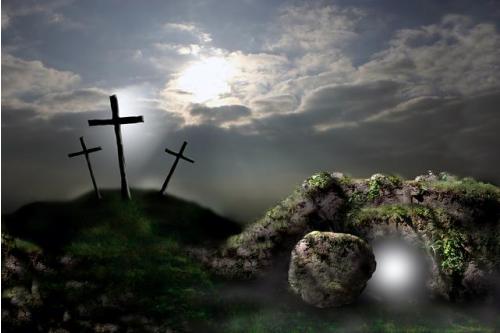
In the Sixth Chapter of the Epistle to the Romans, we hear the following: " . . . Now if we be dead with Christ, we believe that we shall also live with Him . . . " (Romans 6:3)
I would imagine that just about all of us have been in the position at one point or another in our life where we had the feeling that we had hit "rock bottom." Perhaps it came when we had lost a job unexpectedly. Maybe it came about when we struggled with a difficult project that fell apart and we had to start all over again. Maybe it involved health issues or the death of a family member or a close friend. Nonetheless, whatever circumstances we can think of, I am sure that most of us have had the feeling at one point or another that our world came crashing down on us. I know I have felt that way a time or two in my life. I have found myself struggling with some issue and everything seems to go wrong all at once and I feel like the whole world is crashing in on top of my head. But then afterwards I moved forward and the world brightened. In other words, I had to go through the darkest hours in order to finally see the light of dawn ahead of me. And then everything seemed to improve and things got better and better and better . . . . . Sometimes, as I say, we have to hit rock bottom in order to move forward. Sometimes by struggling and going through the darkness, we are able to get stronger and learn from our difficulties. We become strong through our struggles, it would seem. We learn from our mistakes . . . . or at least we should learn from our mistakes. When I look back on my life, I realize now that it was the struggles that made me a stronger human being. It was the times when things seemed the worse, that I was able to move forward and grow stronger. Although we may not want to admit it, it seems like the best "teacher" is to learn from our mistakes.
"Buried with Him in Baptism, wherein also ye are risen with Him through the faith of the operation of God, Who hath raised Him from the dead." (Colossians 2:12)
This is what we are also hearing from today's passage from the Epistle to the Romans, that through death to sin we are able to live again with Christ. It is through dying to self that we can live with Christ. It is through dying to the world that we can live with Our Blessed Saviour. We must never forget that Christ did not experience Easter Morning without first carrying His Cross to the hill at Calvary. The same is true for us. We can not truly live in Christ until we have died to our sinful ways. And for most us, this is painful whether we want to admit it or not. As human beings, we want things our way. We want people to do things the way we want them to be done. We want to be comfortable. We desire our wants and we want them right now. We focus on our own needs and desires and forget about what God wants for us. Most of us, quite frankly, only go running to God when we need Him for something. Other than that, we go our own way in life. But sin is a barrier that keeps us away from God. Sin is like a brick wall that we keep running into time and time and time again. We have to remove the brick wall of sin in order not to run into it again. And once we do this. Once we die to our sinful selves. Once we do all we can to get rid of the sinful desires in our life, it allows us to focus more and more on God and less and less on ourselves.
Finally, we should never forget to emphasize the fact that despite the fact that we were sinners, Christ chose to die for us. "But commendeth His love for us, in that, while we were yet sinners, Christ died for us." (Romans 5:8) God loves us despite the fact that we are sinners. God loves us nonetheless. This is all the more reason that we should do our best NOT to sin so that we do not offend God. God never forsakes His people He loves us despite our sinfulness. Christ died on the Cross to save us from our sins. Christ died on the Cross to achieve something that you or I could never hope to achieve: to wipe away our sins. "Who His own self bare our sins in His own body on the tree, that we, being dead to sins, should live unto righteousness: by whose stripes ye were healed." (I St. Peter 2:24)
"Surely He hath borne our griefs, and carried our sorrows: Yet we did esteem Him stricken, Smitten of God, and afflicted.
But He was wounded for our transgressions, He was bruised for our iniquities: The chastisement of our peace was upon Him; And with His stripes we are healed.
All we like sheep have gone astray; We have turned every one to his own way:And the Lord hath laid on Him the iniquity of us all.
He was oppressed, and He was afflicted; Yet He opened not His mouth:
He is brought as a lamb to the slaughter,And as a sheep before her shear ers is dumb, So He opened not His mouth." (Isaiah 53:4-7)

The Funny Pharmacy
A joyful mind maketh age flourishing: a sorrowful spirit drieth up the bones. - Proverbs 17:22
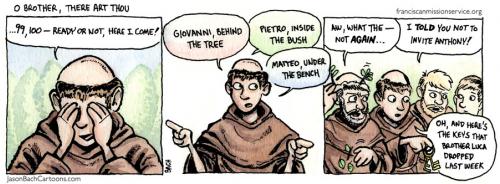


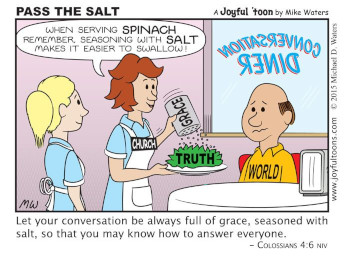



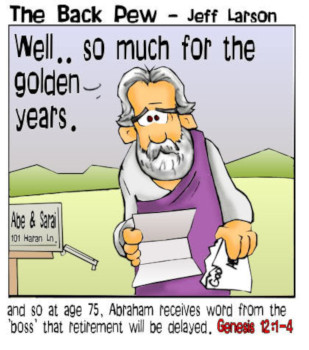


What would you say proves your papal claimant as Pope of the Universal Church as valid?
The Catholic Church teaches that a heretic cannot become Pope any more than an unbaptized person or a woman. This is stated in the Papal Bull, Cum Ex Apostolatus Officio of Pope Paul IV in paragraph 6.
Diocesan Bishops as the Ecclesia Docens (Teaching Church) are held to a higher level in regard to doctrine. It is their duty to see to it that everything taught in their diocese is true Catholic doctrine. Canon Law gives them the right and duty to judge matters of heresy in their own diocese and to absolve from the excommunication for heresy. Therefore they are required to know Catholic teaching. If they commit the crime of heresy, they are presumed to have done so willingly. Therefore they are presumed to incur all of the penalties attached to heresy.
Heretics resign all offices they may hold in the Church and Canon Law accepts their resignation without need of any declaration on the part of a superior.
The Second Vatican Council taught heresy in several documents, including but not limited to the Decree on the Liturgy, the Decree on Ecumenism and the Decree on the Relation of the Church to Non-Christian Religions.
All but four bishops present voted for the Decree on the Liturgy. Also, unless they state otherwise, all of the bishops present are presumed to have signed all of the decrees of Vatican II. Such is an act of notorious public heresy. Therefore by the end of Vatican II, every bishop present had resigned his office by the commission of public heresy, including the Bishop of Rome, John the Baptist Montini, who had taken the name of Paul VI.
And thus, by the end of Vatican II there was only one Cardinal left, Cardinal Mindszenty, and no Pope. With the Papacy vacant, the Church needed a Pope. Mindszenty died in 1975, therefore the Church had no Cardinals to elect a Pope.
When the Church is without Cardinals, theologians and canonists teach that she must supply herself with a Pope in an extraordinary manner. This they teach is a matter of the Natural Law, since a perfect society always has the ability to supply itself with a ruler. The Church is a perfect society, so it is always possible to elect a Pope, here and now.
The first principle is that the first elected has the Papacy. This is known as first in time, first in right. Also nothing invalidates the election of a Pope, except the election of someone not qualified by Divine Law. Divine Law holds that the unbaptized, women and heretics cannot be elected as Pope. Ecclesiastical Law cannot regulate who may be elected Pope. Every attempt to issue such a law has been set aside by the election of someone not qualified. One such attempt was to limit election to the Cardinals. The electors set this aside by electing someone who was not a Cardinal. Fraud and even simony do not render an election of a Pope invalid.
A reasonable attempt must be made to summon the electors after an office becomes vacant. Those who appear on the day appointed are the electors. Even the absence of a majority of qualified electors does not render an election invalid as history proves.
Beginning in the early 1970's both the fact of the vacancy of the papacy and the necessity of electing a Pope was discussed by Catholics. On July 16, 1990 a group of Catholics assembled and elected David Bawden as Pope, who took the name of Pope Michael. This group made every effort possible to notify all those who might be qualified, including contacting each and every chapel listed as sedevacantist, meaning that they believed the papacy was vacant.

The Pope Speaks: July 2018
Studying the Faith In This Crisis
“Save me, O Lord, for there is now no saint: truths are decayed from among the children of men. They have spoken vain things every one to his neighbour: with deceitful lips, and with a double heart have they spoken.” (Psalms 11:2-3)
Indeed we are in these times, when charity has grown cold.1
We Must First Be Spiritual
Now we have received not the spirit of this world, but the Spirit that is of God; that we may know the things that are given us from God. Which things also we speak, not in the learned words of human wisdom; but in the doctrine of the Spirit, comparing spiritual things with spiritual. But the sensual man perceiveth not these things that are of the Spirit of God; for it is foolishness to him, and he cannot understand, because it is spiritually examined. But the spiritual man judgeth all things; and he himself is judged of no man. (I Corinthians 2:12-15)
A footnote in the Douay-Rhiems Bible defines the sensual man: “The sensual man is either he who is taken up with sensual pleasures, with carnal and worldly affections; or he who measures divine mysteries by natural reason, sense, and human wisdom only. Now such a man has little or no notion of the things of God. Whereas the spiritual man is he who, in the mysteries of religion, takes not human sense for his guide: but submits his judgment to the decisions of the church, which he is commanded to hear and obey. For Christ hath promised to remain to the end of the world with His church, and to direct her in all things by the Spirit of truth.”
We must ask ourselves seriously, am I sensual? If I am sensual, then I am not spiritual, as these two are mutually exclusive. There are three ways to be sensual.
The first way is to be taken up with sensual pleasures. Now this can even extend to lawful pleasures, which are sought with too much attention and even devotion. How many live to eat, rather than eat to live?
The second way to be sensual is to be taken up with carnal and worldly affections. We find this out by consider how much effort we put into obtaining sensual gratifications. Do we long for that T-bone steak we will have this evening so much, that we do not consider spiritual things throughout the day? The spiritual man makes a morning meditation on something spiritual in order to set the tone for the day. We should find that our mind wanders often to something spiritual, such as a verse from Sacred Scripture. If not, then we must suspect that we are still sensual.
The third way to be sensual is to “measure divine mysteries by natural reason, sense, and human wisdom only.” The spiritual man realizes that reason is the servant not the master of Faith. We believe what God reveals on the authority of God, Who reveals it, who cannot deceive us. Jesus says: “I am the way, the truth, and the life.” (John 14:6) We use reason to apply the truths of the Faith to concrete situations. We start with an Act of Faith from our heart. The words in prayers are helpful in guiding our Act of Faith, but the Act of Faith must come from our heart not merely from our lips. We must live by faith.2
Charity
But the end of all is at hand. Be prudent therefore, and watch in prayers. But before all things have a constant mutual charity among yourselves: for charity covereth a multitude of sins. (I Peter 4:7;8)
Charity is love of God and love of our neighbor for the love of God. As Scripture says, “God is charity.”3
And because iniquity hath abounded, the charity of many shall grow cold. Mathew 24:12
We considered this briefly above. We must be on fire with the love of God. There is much in Scripture to encourage and direct us. Saint Paul wrote a summary of charity in the thirteenth chapter of first Corinthians, which we should read and consider in our hearts. Saint Alphonsus wrote an excellent commentary on this chapter of First Corinthians. Is that a description of how we live? Let us consider one point from this chapter: “Charity seeks not her own.” We must be selfless, for the sensual man is selfish. We must be seeking the Will of God, not our own will.
Knowledge
My people have been silent, because they had no knowledge: because thou hast rejected knowledge, I will reject thee, that thou shalt not do the office of priesthood to me: and thou hast forgotten the law of thy God, I also will forget thy children. (Osee 4:6)
Another version translates this as: “My people perish for lack of knowledge.” Saint John Vianney says that the majority of Catholics who go to hell, go because they do not know their own religion. How long has it been, since you picked up a catechism book? Do you know the Faith at the level of the Roman Catechism?
“Ignorance of Scripture is ignorance of Christ,” Saint Jerome. When was the last time you opened your Bible? Have you made notes in your Bible? This may sound like sacrilege, but we should make note of those points, which strike us. If you do not write in your Bible, then at least have a notebook to make notes in, so you can do back and consider these points again.
Love Truth
And then that wicked one shall be revealed whom the Lord Jesus shall kill with the spirit of his mouth; and shall destroy with the brightness of his coming, him, Whose coming is according to the working of Satan, in all power, and signs, and lying wonders, And in all seduction of iniquity to them that perish; because they receive not the love of the truth, that they might be saved. Therefore God shall send4 them the operation of error, to believe lying: That all may be judged who have not believed the truth, but have consented to iniquity. (II Thessalonians 2: 8-11)
The truth may be a hard saying as some found towards the end of the sixth chapter of John's Gospel.5 We must love truth, even if it is a hard saying or requires some sacrifice on our part. Remember we are to be selfless, not self-seeking. This portion of Sacred Scripture refers to the time of Antichrist, who some fear may be upon us soon. Notice that because people did not love truth, God send them the operation of error to believe lying. If we consider what many in the world today believe, it certainly is erroneous. In fact, we could call the modern belief system the operation of error.
Do Not Be Distracted
The operation of error is a distraction for sensual people, who call themselves Christian. It is easy to become distracted in trying to fight the operation of error, when we should not spend time considering what they believe out there in the world. Did Jesus or the Apostles speak much about the errors of the world? They only did so, when God's People became involved in these errors. No, Jesus taught us how we should live. Our own focus should be in how we should be living, not in trying to refute the operation of error. Even if we come up with an iron clad proof, they will not believe it, because their heart is in the operation of error, because they do not love truth. Basically sensual people are unreasonable, so we cannot reason them into believing the truth.
We have far more important things to do than to waste time trying to overthrow the operation of error. Let us attract people to the truth by the way we live. Let us pray to God, that He may touch their hearts and convert them from their evil ways.
But sanctify the Lord Christ in your hearts, being ready always to satisfy every one that asketh you a reason of that hope which is in you. (I Peter 3:15)
Do you know your faith well enough, that you can explain it to someone who sincerely wants to know the truth? Let us not waste time on those who are merely curious or wish to start an argument. Arguments are a waste of time.
Priorities
Decades ago before the internet a book was written, The Cult of Information. It said that we have a lot of information available, but that it is poorly assembled and poorly presented. It is easy to drown with all of this information. We need to set out priorities. What do we truly need to know? Then we need to limit our self to acquiring the information we truly need, and ignore the rest. Our first priority is to learn the Faith and the Science of the Saints. This is why daily spiritual reading is essential. We need to acquire the information necessary to perform our job and discharge the duties of our state of life.
What is more important, there are many things we do not need to know. In the world, the maxim is “if it bleeds, it leads.” The world looks for sensational stories, whereas we have no time for such things. Many of these stories are utter wastes of time. We do not have time to find about them and to form an opinion.
Remember The Enemy wants to distract us and get us to waste our time on what is unimportant, so that we do not seek what is truly important.
And the Lord answering, said to her: Martha, Martha, thou art careful, and art troubled about many things: But one thing is necessary. Mary hath chosen the best part, which shall not be taken away from her. (Luke 10:41-42)
We spend very little time at the feet of Jesus and too much time with these distractions. Our priorities are wrong.
Conclusion
This is not a how-to guide for researching the truths necessary to sort out the crisis in the Catholic Church, but rather a preparation of our heart to receive the truth and live by what it points out that we must do. Without this essential preparation, we cannot sort things out. We need the help of the Holy Ghost, to Whom we should pray fervently for guidance. Once we are living a truly spiritual life, the rest will become much simpler. The Holy Ghost will educate us and send us the truth in His time and in a way that we can sort it out point at a time.
Let us pray, Pope Michael
1. Matthew 24:12: “And because iniquity hath abounded, the charity of many shall grow cold.”
2. Romans 1:17; “The just man liveth by faith.”
3. I John 4:8
4. "God shall send": That is God shall suffer them to be deceived by lying wonders, and false miracles, in punishment of their not entertaining the love of truth.
5. Go look it up. This is a good exercise to improve our knowledge and understanding.


Dear soul, it is a joy to write to you again.
As we continue in our readings of the "Chapters on Prayer" from Evagrius, I think you will see more and more the fundamental soundness of the guidance which is offered, as well as the nearly predictable and natural progression from one concern to the next.
So, keeping in mind what we've had read before, let us head forward and explore the next decade of chapters:
41. See whether you stand truly before God in your prayer, or are overcome by the desire for human praise, using prolonged prayer as a disguise.
This can not be overstated, my dear soul. How often we are quick to assure others of prayer, to put forward offers of "thoughts and prayers," on social media! Are these promises of prayer actually kept, or are they used simply as a rote gesture? Resolve to stand truly before God in prayer - and then do it.
42. Whether you pray with brethren or alone, try to pray not simply as a routine, but with conscious awareness of your prayer.
This instruction follows from the warning of the previous instruction. Do not pray - or even make the promise of prayer - as a rote gesture, one in which your mind wanders far from where you actually are and what you are actually doing. In this, the simple routine can be distinguished from the good habit of prayer. The simple routine might barely even involve the mindfulness of what one is doing. The good habit, however, penetrates even to the region of the heart. But how to know the difference? You will konw by the fruits which come from your prayer. Let us continue reading, then:
43. Conscious awareness of prayer is concentration accompanied by reverence, compunction and distress of soul as it confesses its sins with inward sorrow.
Here we see the fruit of the genuine good habit of prayer, dear soul. It has as its fruits those good things that Evagrius here enumerates. It urges the soul to unburden itself of its sins, and through the light of grace allows the genuine prayer-er to see all the more clearly within one's own heart.
44. If your intellect is still distracted during prayer, you do not yet know what it is to pray as a monk; but your prayer is still worldly, embellishing the outer tabernacle.
While Evagrius is addressing this instruction toward those who live the monastic life, the truth here is relatable to all. For the monk is no more a Christian than the one who lives in the world. Those in the world, in whatever state of life in which they may live are no less Christians than the ascetics. All are called to genuine and pure prayer before God.
You will find, dear soul, that distractions of the intellect during prayer are simply the lot of those of us who remain in this life. Until such time as we stand before our Lord in our own particular judgment, we are able to make progress in our prayer life. To continue to struggle in the uprooting of distraction within the soul is quite simply the path which we take to make progress. The key is never, never to allow discouragement to keep you from moving forward, to keep you from arising after a fall. The grace of God is sufficient!
45. When you pray, keep close watch on your memory, so that it does not distract you with recollections of your past. But make yourself aware that you are standing before God. For by nature the intellect is apt to be carried away by memories during prayer.
Here a good distinction is made, dear soul. We have just learned not to allow discouragement to keep us from going forward. We must also not allow discouragement to cause us to look back on our falls. We make advancement in the spiritual life not through remembrance of past failures, but of bearing our present crosses. Keep this in mind, dear soul. Do not allow the intellect free rein while in prayer, for you run the great risk enumerated next:
46. While you are praying, the memory brings before you fantasies either of past things, or of recent concerns, or of the face of someone who has irritated you.
The untrained intellect chafes under the yoke of prayer, and will - under the pretence of piety - lead you in circular fashion instead of along the straight path. Remember that even the intellect of man suffers from the effects of sin! Gently return it to the simple attention to prayer and being in the presence of God, whenever you avert to it having strayed.
47. The demon is very envious of us when we pray, and uses every kind of trick to thwart our purpose. Therefore he is always using our memory to stir up thoughts of various things and our flesh to arouse the passions, in order to obstruct our way of ascent to God.
You see here, dear soul, the importance of keeping control of the intellect during prayer. For the straying of the intellect is used as a tool against us by the devils. Truly he who does not keep rein of his intellect during prayer opens wide the door of his heart to desolation. As always, gently return your mind to the purpose of your prayer and to the presence of God when you notice that it has strayed.
48. When after many attempts the cunning demon fails to hinder the prayer of the righteous man, he slackens his efforts a little, and then gets his own back when the man has finished praying. Either he provokes the man to anger, and so destroys the good effects of the prayer, or else he excites him to senseless pleasure, and so degrades his intellect.
The attacks and incursions of the devil can be brutal or they can be subtle, for the enemy is a master of reading human behaviour, dear soul. You see here how the emotions, both positive and negative, can be inflamed in order to destroy the genuine fruit of prayer, and to weaken the intellect. For this reason, pray that you may overcome the passions, in order to serve God in genuine purity of heart.
49. Having prayed as you should, expect the demon to attack you: so stand on guard, ready to protect the fruits of your prayer. For this from the start has been your appointed task: to cultivate and to protect (cf Gen. 2:15). Therefore, having cultivated, do not leave the fruits unprotected; otherwise you will gain nothing from your prayer.
Here, dear soul, we hear a hard truth: when we do as we should, we ought to expect the attacks of the enemy. Contrary to modern "wisdom," however, the converse is not always true. You will often hear that the devils will not attack those who are already in the state of delusion or the state of sin. This is a falsehood. The devils are capricious and will attack and betray every being, including each other. Therefore, the attacks of the devils ought not be taken as proof that you are doing the will of God. Look rather at what you actually are doing and to the fruit which it produces in your soul, and leave the attacks of the devils to the devils.
50. The warfare between us and the demons is waged solely on account of spiritual prayer. For prayer is extremely hateful and offensive to them, whereas it leads us to salvation and peace.
And here we have the final consideration for this month, dear soul. What we read here does not contradict what I have said in regard to the previous "chapter." For the devils will attack those who pray in order to destroy the fruit of prayer. And the devils will attack those who do not pray in order to keep them from genuine prayer.
They attack those who do not pray in order to keep them from genuine prayer in two ways. Firstly, the devils attack in order to cause greater confusion, depression, and isolation in the soul, causing the victim to fall into despair. Secondly, and more insidiously, the devils attack the one in spiritual delusion so that he may think the attacks are a proof that he is, contrary to fact, in the state of grace. This causes greater attachment to spiritual delusion within the soul, and ultimately to catastrophic spiritual failure.
Give no import to the "meaning" of the attacks of the devils, dear soul. Rather, turn your intellect toward your prayer. Do not open your mind to the devils by questioning their motives when they attack. Open rather your heart to the grace of God which He offers to the one who prays in simplicity and purity.
Here we end for this month, dear soul. Next month, Evagrius will have more good counsel for us. Let us take what we have learned here and let us live it!
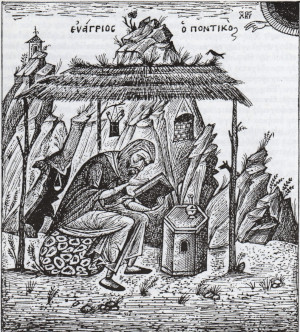
Evagrius the Solitary

Saints from East and West
Saints whose feasts are celebrated this month
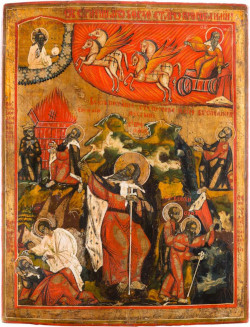
July 23 (Byzantine) - Holy Prophet Elias
The Holy Prophet Elias (Elijah) was one of the greatest of the prophets and the first dedicated to virginity in the Old Testament. He was born in Galaadian Thesbia (Tishbe) into the Levite tribe 900 years before the Incarnation of the Word of God.
Saint Epiphanius of Cyprus gives the following account about the birth of the Prophet Elias: "When Elias was born, his father Sobach saw in a vision, that handsome men greeted him, they swaddled him in fire, and fed the fiery flame." The name Elias (meaning "the Lord's strength") given to the infant defined his whole life. From the years of his youth he dedicated himself to the One God, settled in the wilderness, and spent his whole life in strict fasting, divine meditation, and prayer.
Called to prophetic service before the Israelite king Ahab, the prophet became a fiery zealot of the true faith and piety. During this time the Israelite nation had fallen away from the faith of their fathers, they abandoned the One God and worshipped pagan idols, the worship of which was introduced by the impious king Jereboam. An especial advocate of idol worship was the wife of king Ahab, the paganess Jezebel. The worship of the idol of Baal led the Israelites towards complete moral decay. Beholding the ruin of his nation, the Prophet Elias began to denounce king Ahab for impiety, and exhorting him to repent and turn to the True God. The king would not listen to him. The Prophet Elias then declared to him that in punishment there would then be neither rain nor dew upon the ground, and the dryness would cease only through his prayer. And indeed, through the prayer of the prophet the heavens were closed, and there befell drought and famine throughout all the land. The nation suffered from the incessant heat and hunger. The Lord, through His mercy, seeing the suffering of the people, was prepared to forgive all and send rain upon the earth, but did not want to annul the words of the Prophet Elias, sorrowed with the desire to turn about the hearts of the Israelites to repentance and return them to the true worship of God. Having saved the Prophet Elias from the hands of Jezebel, the Lord during this time of tribulation sent him into a secret place of the stream Horath. The Lord ordered rapacious ravens to bring food to the prophet, moving him to pity for the suffering nation. When the stream Horath dried up, the Lord sent the Prophet Elias to Sidonian Sarepta, to a poor widow who suffered together with her children in the expectation of death by starvation. At the request of the prophet she prepared him a bread with the last measure of flour and the remainder of the oil. Thereafter through the prayer of the Prophet Elias, flour and oil were not depleted in the home of the widow for all the duration of the famine. By the power of his prayer the prophet did another miracle: he resuscitated the dead son of the widow. After the end of three years of drought the Merciful Lord sent the prophet to king Ahab to bring an end to the misfortune. The Prophet Elias gave orders to gather upon Mount Carmel all Israel and the pagan priests of Baal. When the nation had gathered, the Prophet Elias proposed the building of two sacrificial altars: one for the pagan priests of Baal, and the other for the Prophet Elias in the service of the True God. "Upon whichever shalt come down upon it fire from the heavens, that one wilt be shewn to have the True God," said the Prophet Elias, "and all shalt be obliged to worship Him, and if not invoking Him shalt be given over to death."
The prophets of Baal rushed off first to offer sacrifice. They called out to the idol from morning till evening, but in vain; the heavens were silent. Towards evening the holy Prophet Elias built up his sacrificial altar from twelve stones - the number of the tribes of Israel. He placed the sacrifice upon the firewood, gave orders to dig a ditch around the altar and commanded that the sacrifice and the firewood be soaked with water. When the ditch had filled with water, the fiery prophet turned to God with a prayer and asked that the Lord send down fire from the heavens to teach the wayward and obdurate Israelite people and turn their hearts to Himself. Through the prayer of the prophet there came down fire from the heavens and it fell upon the sacrifice, the wood, the stones, and even the water. The people fell down to the ground, crying out: "In truth the Lord is the One God and there is no other besides Him!" Then the Prophet Elias had put to death all the pagan priests of Baal and he began to pray for the sending down of rain. Through his prayer the heavens opened and there came down an abundant rain, watering the parched earth.
King Ahab acknowledged his error and repented his sins, but his wife Jezebel threatened to kill the prophet of God. The Prophet Elias fled into the kingdom of Judea and, grieving over his failure to eradicate idol worship, he asked of God his death. An Angel of the Lord came before him, strengthened him with food and commanded him to go upon a long journey. The Prophet Elias went for forty days and nights and, having arrived at Mount Horeb, he settled in a cave. Here after a terrible storm, an earthquake and a burst of flame, the Lord appeared "in a quiet wind" (3 Kings 19:12) and revealed to the grieving prophet that He preserved seven thousand faithful servants who were not worshippers of Baal. The Lord commanded the Prophet Elias to anoint Eliseus (Elisha) unto prophetic service. Because of his fiery zeal for the Glory of God the Prophet Elias was taken up alive to Heaven on a fiery chariot. The Prophet Eliseus began with the testimony of the ascent of the Prophet Elias to the heavens on a fiery chariot and received together with his descended mantle a gift of prophetic spirit twice as great than the Prophet Elias had possessed.
According to the tradition of Holy Church, the Prophet Elias will be a Forerunner of the Terrible Second Coming of Christ upon the earth and during the time of preaching will be a sign of bodily death.
The life of the holy Prophet Elias is recorded in the Old Testament books (3 Kings; 4 Kings; Ecclesiasticus 48:1-15; 1 Machabees 2:58). At the time of the Transfiguration the Prophet Elias conversed with the Saviour upon Mount Thabor (Mt. 17:3; Mk. 9:4; Lk. 9:30).
For the day of the fiery ascent of the Prophet Elias his veneration in the Church of Christ was constant over the centuries. The eastern Church venerates the Prophet Elias among the saints, keeping his feast on the twenty-third day of the month of July.
The iconographic tradition portrays the Prophet Elias rising up on a chariot with fiery wheels, which are encircled on all sides with flames and harnessed to four winged horses.
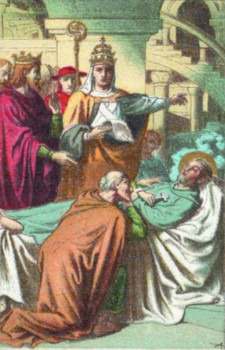
July 17 - Saint Alexius
At Rome, Saint Alexius, confessor, son of the senator Euphemian. Leaving his spouse before the night of marriage, he withdrew from his house, and after a long pilgrimage, returned to Rome where he was for seventeen years harboured in his father's house as an unknown pauper, thus deluding the world in this strange way. After his death, however, becoming known through a voice heard in the churches of the city, and by his own writings, he was, under the sovereign Pontiff Innocent I, translated to the Church of Saint Boniface, where he wrought many miracles.Saint Alexius was the only son of a rich senator of Rome, Euphemian, and his wife Aglae, born and educated in that capital in the fifth century. From the charitable example of his parents he learned that the riches which are given away to the poor remain with us for ever, and that alms-deeds are a treasure transferred to Heaven, with the interest of an immense reward. Whilst yet a child he was intent on the relief of all whom he saw in distress, and thought himself obliged to those who received his charity and regarded them as his benefactors. Fearing lest the distraction of earthly honours might at length divide or draw his heart too much from more noble objects, he decided to renounce the advantages of his birth and retire from the world.
Having, in compliance with the will of his parents, married a wealthy girl, he on the very day of the wedding parted from her with her consent. In disguise he travelled into Syria, embraced extreme poverty, and resided in a hut adjoining a church dedicated to the Mother of God at Edessa. Here he lived for seventeen years, begging alms at the church doors, which he shared with other poor people, existing himself on what little was left over from their needs, until an image of our Lady spoke and revealed his holiness to the people, calling him "the Man of God." Thereupon he fled back to his home.
His father did not recognize him, but received him as a beggar and gave him employment, allotting a corner under the staircase as his quarters. For another seventeen years he thus lived unknown in his father's house, bearing the ill-treatment at the other servants in patience and silence. After his death a writing was found upon him, giving his name and family and an account of his life.
His fame spread throughout the Catholic world. His history was related and his prayers begged in a canon composed by Saint Joseph the Hymnographer. Special devotion to the saint was held in Rome, and towards the end of the tenth century, the exiled metropolitan of Damascus, Sergius, established at Rome a monastery of Greek monks, residing at the church of Saint Boniface on the Aventine, adding the name of Saint Alexius to the church as co-titular.
As a citizen of Rome the saint had a vast popularity, and this popularity has persisted. In the twelfth century his story is said to have had a deep influence on the heretic Peter Waldo; in the fifteenth, he was chosen as the patron of the nursing congregation commonly called the Alexian Brothers, and in 1817 as a lesser patron of the Congregation of the Sacred Hearts of Jesus and Mary (Picpus Fathers); while in the East he is still greatly venerated as the "Man of God."


Books to feed your faith!
Saint Alphonsus wrote this book centuries ago and its lessons are as timely today as they were then. Dearly beloved Christian, impress well on your mind the mysteries of your holy faith, and the things that are necessary for making your confessions and Communions with fruit. And after having learned them well, repeat them at home and teach them to others. You will thus give great pleasure to Jesus Christ; and with a little trouble you shall share in and gain all the good which, through your instructions, others shall afterwards do.
Saint Alphonsus Ligouri -Charity is patient, is kind: charity envieth not, dealeth not perversely; is not puffed up; Is not ambitious, seeketh not her own, is not provoked to anger, thinketh no evil; Rejoiceth not in iniquity, but rejoiceth with the truth; Beareth all things, believeth all things, hopeth all things, endureth all things. (I Corinthians 13:4-7) Saint Paul wrote wonderfully about charity in the 13th chapter of First Corinthians. Saint Alphonsus takes these words and gives a simple view of the Catholic way of life and an excellent introduction into the spiritual life. This is excerpted from his work, The Holy Eucharist, which has been excerpted from The Complete Works of Saint Alphonsus, which was compiled and translated by Father Eugene Grimm. (1835-1891)
Centuries before the Catechism of the Catholic Church was published in 1992, encouraged by the Council of Trent, a catechism was prepared called the Roman Catechism or the Catechism of the Council of Trent. It was prepared for use by Pastors to instruct their flocks in the Catholic Faith. Educated lay people should know their faith at this level, therefore this catechism is recommended for study by all Catholics. It is laid out in a far different manner than the 1992 Catechism of the Catholic Church, which is laid out in a similar manner to Henry Denzinger's Enchiridion Symbolorum, which is in translation at the Sources of Catholic Dogma.
Liberalism has crept into the highest places in the Catholic Church. This work exposes this heresy quite well. In 1886 there appeared in Spain a little work under the title El Liberalismo es Pecado, "Liberalism Is a Sin," by Don Felix Sarda y Salvany, a priest of Barcelona and editor of a journal called La Revista Popular. The book excited considerable commotion. It was vigorously assailed by the Liberals. A Spanish Bishop of a Liberal turn instigated an answer to Dr. Sarda's work by way of another Spanish priest. Both books were sent to Rome, praying the Sacred Congregation of the Index to put Dr. Sarda's work under the ban.
For More Good Traditional Catholic Books:
Brother Hermenegild's Spiritual Bookshelf
Pope Michael's Books
Christ the King Library


It's summer (in the northern hemisphere, at least)! Those of you who grow gardens will be seeing a good crop of produce start coming in. Sometimes, there's such a bounty that you quickly run out of ideas for using it! This month, the Monk's Kitchen is happy to provide a couple of ideas for those cucumbers and zucchini that you're going to like.
German Cucumber Salad

Prep: 20 minutes
Ready In: 8 hours
"A traditional German favorite that I have loved since I was a child. This recipe is quick, easy, and delicious. Substitute cider vinegar for a different flavor. I prefer to leave the skins on the cucumbers for more texture and flavor, but they can also be peeled prior to slicing if desired. Flavor is best when marinated for several hours before serving."
Ingredients
2 large cucumbers, sliced thin
1/2 onion, sliced thin (optional)
1 teaspoon salt
1/2 cup sour cream
2 tablespoons white sugar
2 tablespoons white vinegar
1 teaspoon dried dill
1 teaspoon dried parsley
1 teaspoon paprika
Directions
Spread cucumbers and onion on a platter; season with salt and let rest for 30 minutes. Squeeze excess moisture.
Stir sour cream, sugar, vinegar, dill, and parsley together in a large bowl.
Fold cucumber and onion slices into the sour cream mixture.
Refrigerate 8 hours to over night; garnish with paprika to serve.
Blueberry Zucchini Bread

Prep: 15 minutes
Cook: 50 minutes
Ready In: 1 hour 45 minutes
"Blueberries and zucchini baked up into delicious little summertime bread loaves!"
Ingredients
3 eggs, lightly beaten
1 cup vegetable oil
3 teaspoons vanilla extract
2 1/4 cups white sugar
2 cups shredded zucchini
3 cups all-purpose flour
1 teaspoon salt
1 teaspoon baking powder
1/4 teaspoon baking soda
1 tablespoon ground cinnamon
1 pint fresh blueberries
Directions
Preheat oven to 350 degrees F (175 degrees C). Lightly grease 4 mini-loaf pans.
In a large bowl, beat together the eggs, oil, vanilla, and sugar. Fold in the zucchini. Beat in the flour, salt, baking powder, baking soda, and cinnamon. Gently fold in the blueberries. Transfer to the prepared mini-loaf pans.
Bake 50 minutes in the preheated oven, or until a knife inserted in the center of a loaf comes out clean. Cool 20 minutes in pans, then turn out onto wire racks to cool completely.

Video sermons and instructions: Both brand new and from years past!
Seventh Sunday after Pentecost
Ninth Sunday after Pentecost
The Necessity of Mortification
Christ the King Library: The Man Who Fought the Devil - Chapter 1
VIE Catholic Radio Present: True Stories Of First Communion #4 June 2018


VIE CATHOLIC RADIO EVENTS FOR JULY
July 2018: Most Precious Blood of Jesus
We are over halfway through the year as we enter into the month of July. July is one of my favorite months in the year. For example, Did you know that July 1st is International Joke Day? Yep sure is. With that in mind here is my joke to help celebrate.
Two Jesuit novices both wanted a cigarette while they prayed. They decided to ask their superior for permission. The first asked but was told no. A little while later he spotted his friend smoking and praying. "Why did the superior allow you to smoke and not me?" he asked. His friend replied, "Because you asked if you could smoke while you prayed, and I asked if I could pray while I smoked!"
Okay on a more serious note. July 1st is also the feast day of The Most Precious Blood of Our Lord Jesus Christ.
Catholic doctrine teaches the faithful that the blood of Jesus Christ is part of His Sacred Humanity and hypostatically united to the Second Person of the Blessed Trinity.
It is for this reason that we at VIE Catholic Radio are wanting to show honor toward the Most Precious Blood of Our Lord Jesus Christ during the whole month of July.
We invite you to join us through our weekly homilies on the devotion to the Most Precious Blood, to consider the power of His blood in our lives and that apart from the redeeming power of the blood of Jesus Christ, we were doomed.
If you missed the Sundays sermon on The Most Precious Blood, you can catch it every Tuesday, Thursday and Saturday as well.
Now we have a very special program coming up on the feast day of Our Lady of Mount Carmel which is the 16th. You will not want to miss it. The topic that will be discussed has over the years been a controversial and misunderstood subject. And I think you will find it most interesting!
For the times and days for these programs go to the VIE Catholic web site and click on the Program tab.
We have people from all over the world that tune in to the Vie Catholic Radio network, In fact, those who are listening in have not only doubled but have continued to grow every month! But few contact us to tell us what they think. So I encourage you to please email us or write us with your thoughts and let us get to know you. For everyone that contacts us we will send a free copy of the Gospel of John, a rosary and a rosary pamphlet. It will be our gift to you, thanking you for taking the time to contact us. But please give us your mailing address so that we can send them out to you. To get OUR address, or to contact us by email please go to the contact page at WWW.VIECatholicRadio.com . And Lastly, these programs are provided for you free of charge but it does cost us money to get them out to you. We sure would appreciate any financial help that the Lord would lay on your heart to give. We have a small group of people who faithfully send us a gift to help us with the up keep of this station. And we are so grateful for what they give. And of course we all ways need your prayers. Thanks for taking the time to tune in and listen. We pray that our programs will continue to be a blessing to you and your family.


Saint Basil the Great: On Creation
"The Earth was Invisible and Unfinished."
1. In the few words which have occupied us this morning we have found such a depth of thought that we despair of penetrating further. If such is the fore court of the sanctuary, if the portico of the temple is so grand and magnificent, if the splendour of its beauty thus dazzles the eyes of the soul, what will be the holy of holies? Who will dare to try to gain access to the innermost shrine? Who will look into its secrets? To gaze into it is indeed forbidden us, and language is powerless to express what the mind conceives. However, since there are rewards, and most desirable ones, reserved by the just Judge for the intention alone of doing good, do not let us hesitate to continue our researches. Although we may not attain to the truth, if, with the help of the Spirit, we do not fall away from the meaning of Holy Scripture we shall not deserve to be rejected, and, with the help of grace, we shall contribute to the edification of the Church of God.
The earth, says Holy Scripture, was invisible and unfinished. The heavens and the earth were created without distinction. How then is it that the heavens are perfect while the earth is still unformed and incomplete? In one word, what was the unfinished condition of the earth? And for what reason was it invisible? The fertility of the earth is its perfect finishing; growth of all kinds of plants, the upspringing of tall trees, both productive and sterile, flowers' sweet scents and fair colours, and all that which, a little later, at the voice of God came forth from the earth to beautify her, their universal Mother. As nothing of all this yet existed, Scripture is right in calling the earth without form. We could also say of the heavens that they were still imperfect and had not received their natural adornment, since at that time they did not shine with the glory of the sun and of the moon and were not crowned by the choirs of the stars. These bodies were not yet created. Thus you will not diverge from the truth in saying that the heavens also were without form. The earth was invisible for two reasons: it may be because man, the spectator, did not yet exist, or because being submerged under the waters which over-flowed the surface, it could not be seen, since the waters had not yet been gathered together into their own places, where God afterwards collected them, and gave them the name of seas. What is invisible? First of all that which our fleshly eye cannot perceive; our mind, for example; then that which, visible in its nature, is hidden by some body which conceals it, like iron in the depths of the earth. It is in this sense, because it was hidden under the waters, that the earth was still invisible. However, as light did not yet exist, and as the earth lay in darkness, because of the obscurity of the air above it, it should not astonish us that for this reason Scripture calls it invisible.
2. But the corrupters of the truth, who, incapable of submitting their reason to Holy Scripture, distort at will the meaning of the Holy Scriptures, pretend that these words mean matter. For it is matter, they say, which from its nature is without form and invisible—being by the conditions of its existence without quality and without form and figure. The Artificer submitting it to the working of His wisdom clothed it with a form, organized it, and thus gave being to the visible world.
If matter is uncreated, it has a claim to the same honours as God, since it must be of equal rank with Him. Is this not the summit of wickedness, that an extreme deformity, without quality, without form, shape, ugliness without configuration, to use their own expression, should enjoy the same prerogatives with Him, Who is wisdom, power and beauty itself, the Creator and the Demiurge of the universe? This is not all. If matter is so great as to be capable of being acted on by the whole wisdom of God, it would in a way raise its hypostasis to an equality with the inaccessible power of God, since it would be able to measure by itself all the extent of the divine intelligence. If it is insufficient for the operations of God, then we fall into a more absurd blasphemy, since we condemn God for not being able, on account of the want of matter, to finish His own works. The poverty of human nature has deceived these reasoners. Each of our crafts is exercised upon some special matter— the art of the smith upon iron, that of the carpenter on wood. In all, there is the subject, the form and the work which results from the form. Matter is taken from without— art gives the form— and the work is composed at the same time of form and of matter.
Such is the idea that they make for themselves of the divine work. The form of the world is due to the wisdom of the supreme Artificer; matter came to the Creator from without; and thus the world results from a double origin. It has received from outside its matter and its essence, and from God its form and figure. They thus come to deny that the mighty God has presided at the formation of the universe, and pretend that He has only brought a crowning contribution to a common work, that He has only contributed some small portion to the genesis of beings: they are incapable from the debasement of their reasonings of raising their glances to the height of truth. Here below arts are subsequent to matter— introduced into life by the indispensable need of them. Wool existed before weaving made it supply one of nature's imperfections. Wood existed before carpentering took possession of it, and transformed it each day to supply new wants, and made us see all the advantages derived from it, giving the oar to the sailor, the winnowing fan to the labourer, the lance to the soldier. But God, before all those things which now attract our notice existed, after casting about in His mind and determining to bring into being time which had no being, imagined the world such as it ought to be, and created matter in harmony with the form which He wished to give it. He assigned to the heavens the nature adapted for the heavens, and gave to the earth an essence in accordance with its form. He formed, as He wished, fire, air and water, and gave to each the essence which the object of its existence required. Finally, He welded all the diverse parts of the universe by links of indissoluble attachment and established between them so perfect a fellowship and harmony that the most distant, in spite of their distance, appeared united in one universal sympathy. Let those men therefore renounce their fabulous imaginations, who, in spite of the weakness of their argument, pretend to measure a power as incomprehensible to man's reason as it is unutterable by man's voice.
3. God created the heavens and the earth, but not only half—He created all the heavens and all the earth, creating the essence with the form. For He is not an inventor of figures, but the Creator even of the essence of beings. Further let them tell us how the efficient power of God could deal with the passive nature of matter, the latter furnishing the matter without form, the former possessing the science of the form without matter, both being in need of each other; the Creator in order to display His art, matter in order to cease to be without form and to receive a form. But let us stop here and return to our subject.
The earth was invisible and unfinished. In saying In the beginning God created the heavens and the earth, the sacred writer passed over many things in silence, water, air, fire and the results from them, which, all forming in reality the true complement of the world, were, without doubt, made at the same time as the universe. By this silence, history wishes to train the activity or our intelligence, giving it a weak point for starting, to impel it to the discovery of the truth. Thus, we are not told of the creation of water; but, as we are told that the earth was invisible, ask yourself what could have covered it, and prevented it from being seen? Fire could not conceal it. Fire brightens all about it, and spreads light rather than darkness around. No more was it air that enveloped the earth. Air by nature is of little density and transparent. It receives all kinds of visible object, and transmits them to the spectators. Only one supposition remains; that which floated on the surface of the earth was water— the fluid essence which had not yet been confined to its own place. Thus the earth was not only invisible; it was still incomplete. Even today excessive damp is a hindrance to the productiveness of the earth. The same cause at the same time prevents it from being seen, and from being complete, for the proper and natural adornment of the earth is its completion: grain waving in the valleys— meadows green with grass and rich with many coloured flowers— fertile glades and hill-tops shaded by forests. Of all this nothing was yet produced; the earth was in travail with it in virtue of the power that she had received from the Creator. But she was waiting for the appointed time and the divine order to bring forth.

Catechism Catch-Up
On the Church - Part 1
Introduction: Jesus was the first to mention the Catholic Church (Catholic meaning Universal):
Jesus saith to them: But whom do you say that I am? Simon Peter answered and said: Thou art Christ, the Son of the living God. And Jesus answering, said to him: Blessed art thou, Simon Bar-Jona: because flesh and blood hath not revealed it to thee, but my Father who is in heaven. And I say to thee: That thou art Peter; and upon this rock I will build my church, and the gates of hell shall not prevail against it. And I will give to thee the keys of the kingdom of heaven. And whatsoever thou shalt bind upon earth, it shall be bound also in heaven: and whatsoever thou shalt loose upon earth, it shall be loosed also in heaven. (Matthew 16:16–19)
Peter Our First Pope is the Foundation of the Church
Some have tried to argue that Jesus did not mean that his Church would be built on Peter but on something else.
Some argue that in this passage there is a minor difference between the Greek term for Peter (Petros) and the term for rock (petra), yet they ignore the obvious explanation: petra, a feminine noun, has simply been modified to have a masculine ending, since one would not refer to a man (Peter) as feminine. The change in the gender is purely for stylistic reasons.
These critics also neglect the fact that Jesus spoke Aramaic, and, as John 1:42 tells us, in everyday life he actually referred to Peter as Kepha or Cephas (depending on how it is transliterated). It is that term which is then translated into Greek as petros. Thus, what Jesus actually said to Peter in Aramaic was: "You are Kepha and on this very kepha I will build my Church."
The Church Fathers, those Christians closest to the apostles in time, culture, and theological background, clearly understood that Jesus promised to build the Church on Peter, as the following passages show.
Tatian the Syrian
"Simon Cephas answered and said, ‘You are the Messiah, the Son of the living God.’ Jesus answered and said unto him, ‘Blessed are you, Simon, son of Jonah: flesh and blood has not revealed it unto thee, but my Father which is in heaven. And I say unto thee also, that you are Cephas, and on this rock will I build my Church; and the gates of hades shall not prevail against it" (The Diatesseron 23 [A.D. 170]).
Tertullian
"Was anything withheld from the knowledge of Peter, who is called ‘the rock on which the Church would be built’ [Matt. 16:18] with the power of ‘loosing and binding in heaven and on earth’ [Matt. 16:19]?" (Demurrer Against the Heretics 22 [A.D. 200]).
"[T]he Lord said to Peter, ‘On this rock I will build my Church, I have given you the keys of the kingdom of heaven [and] whatever you shall have bound or loosed on earth will be bound or loosed in heaven’ [Matt. 16:18–19]. . . . What kind of man are you, subverting and changing what was the manifest intent of the Lord when he conferred this personally upon Peter? Upon you, he says, I will build my Church; and I will give to you the keys" (Modesty 21:9–10 [A.D. 220]).
The Letter of Clement to James
"Be it known to you, my lord, that Simon [Peter], who, for the sake of the true faith, and the most sure foundation of his doctrine, was set apart to be the foundation of the Church, and for this end was by Jesus himself, with his truthful mouth, named Peter" (Letter of Clement to James 2 [A.D. 221]).
The Clementine Homilies
"[Simon Peter said to Simon Magus in Rome:] ‘For you now stand in direct opposition to me, who am a firm rock, the foundation of the Church’ [Matt. 16:18]" (Clementine Homilies 17:19 [A.D. 221]).
Origen
"Look at [Peter], the great foundation of the Church, that most solid of rocks, upon whom Christ built the Church [Matt. 16:18]. And what does our Lord say to him? ‘Oh you of little faith,’ he says, ‘why do you doubt?’ [Matt. 14:31]" (Homilies on Exodus 5:4 [A.D. 248]).
Cyprian of Carthage
"The Lord says to Peter: ‘I say to you,’ he says, ‘that you are Peter, and upon this rock I will build my Church, and the gates of hell will not overcome it. And to you I will give the keys of the kingdom of heaven . . . ’ [Matt. 16:18–19]. On him [Peter] he builds the Church, and to him he gives the command to feed the sheep [John 21:17], and although he assigns a like power to all the apostles, yet he founded a single chair [cathedra], and he established by his own authority a source and an intrinsic reason for that unity. Indeed, the others were that also which Peter was [i.e., apostles], but a primacy is given to Peter, whereby it is made clear that there is but one Church and one chair. . . . If someone does not hold fast to this unity of Peter, can he imagine that he still holds the faith? If he [should] desert the chair of Peter upon whom the Church was built, can he still be confident that he is in the Church?" (The Unity of the Catholic Church 4; 1st edition [A.D. 251]).
"There is one God and one Christ, and one Church, and one chair founded on Peter by the word of the Lord. It is not possible to set up another altar or for there to be another priesthood besides that one altar and that one priesthood. Whoever has gathered elsewhere is scattering" (Letters 43[40]:5 [A.D. 253]).
"There John 6:68–69 speaks Peter, upon whom the Church would be built, teaching in the name of the Church and showing that even if a stubborn and proud multitude withdraws because it does not wish to obey, yet the Church does not withdraw from Christ. The people joined to the priest and the flock clinging to their shepherd are the Church. You ought to know, then, that the bishop is in the Church and the Church in the bishop, and if someone is not with the bishop, he is not in the Church. They vainly flatter themselves who creep up, not having peace with the priests of God, believing that they are
secretly [i.e., invisibly] in communion with certain individuals. For the Church, which is one and Catholic, is not split nor divided, but it is indeed united and joined by the cement of priests who adhere one to another" (ibid., 66[69]:8).
Firmilian
"But what is his error . . . who does not remain on the foundation of the one Church which was founded upon the rock by Christ [Matt. 16:18], can be learned from this, which Christ said to Peter alone: ‘Whatever things you shall bind on earth shall be bound also in heaven; and whatever you loose on earth, they shall be loosed in heaven’ [Matt. 16:19]" (collected in Cyprian’s Letters74[75]:16 [A.D. 253]).
"[Pope] Stephen . . . boasts of the place of his episcopate, and contends that he holds the succession from Peter, on whom the foundations of the Church were laid [Matt. 16:18]. . . . [Pope] Stephen . . . announces that he holds by succession the throne of Peter" (ibid., 74[75]:17).
Ephraim the Syrian
"[Jesus said:] ‘Simon, my follower, I have made you the foundation of the holy Church. I betimes called you Peter, because you will support all its buildings. You are the inspector of those who will build on earth a Church for me. If they should wish to build what is false, you, the foundation, will condemn them. You are the head of the fountain from which my teaching flows; you are the chief of my disciples’" (Homilies 4:1 [A.D. 351]).
Optatus
"You cannot deny that you are aware that in the city of Rome the episcopal chair was given first to Peter; the chair in which Peter sat, the same who was head—that is why he is also called Cephas [‘Rock’]—of all the apostles; the one chair in which unity is maintained by all" (The Schism of the Donatists 2:2 [A.D. 367]).
Ambrose of Milan
"[Christ] made answer: ‘You are Peter, and upon this rock will I build my Church. . . . ’ Could he not, then, strengthen the faith of the man to whom, acting on his own authority, he gave the kingdom, whom he called the rock, thereby declaring him to be the foundation of the Church [Matt. 16:18]?" (The Faith 4:5 [A.D. 379]).
"It is to Peter that he says: ‘You are Peter, and upon this rock I will build my Church’ [Matt. 16:18]. Where Peter is, there is the Church. And where the Church is, no death is there, but life eternal" (Commentary on Twelve Psalms of David 40:30 [A.D. 389]).
Pope Damasus I
"Likewise it is decreed . . . that it ought to be announced that . . . the holy Roman Church has not been placed at the forefront [of the churches] by the conciliar decisions of other churches, but has received the primacy by the evangelic voice of our Lord and Savior, who says: ‘You are Peter, and upon this rock I will build my Church, and the gates of hell will not prevail against it; and I will give to you the keys of the kingdom of heaven. . . . ’ [Matt. 16:18–19]. The first see, therefore, is that of Peter the apostle, that of the Roman Church, which has neither stain nor blemish nor anything like it" (Decree of Damasus 3 [A.D. 382]).
Jerome
"‘But,’ you [Jovinian] will say, ‘it was on Peter that the Church was founded’ [Matt. 16:18]. Well . . . one among the twelve is chosen to be their head in order to remove any occasion for division" (Against Jovinian 1:26 [A.D. 393]).
"I follow no leader but Christ and join in communion with none but your blessedness [Pope Damasus I], that is, with the chair of Peter. I know that this is the rock on which the Church has been built. Whoever eats the Lamb outside this house is profane. Anyone who is not in the ark of Noah will perish when the flood prevails" (Letters 15:2 [A.D. 396]).
Augustine
"If the very order of episcopal succession is to be considered, how much more surely, truly, and safely do we number them [the bishops of Rome] from Peter himself, to whom, as to one representing the whole Church, the Lord said, ‘Upon this rock I will build my Church, and the gates of hell shall not conquer it.’ Peter was succeeded by Linus, Linus by Clement. ... In this order of succession a Donatist bishop is not to be found" (Letters 53:1:2 [A.D. 412]).
Council of Ephesus
"Philip, the presbyter and legate of the Apostolic See [Rome], said: ‘There is no doubt, and in fact it has been known in all ages, that the holy and most blessed Peter, prince and head of the apostles, pillar of the faith, and foundation of the Catholic Church, received the keys of the kingdom from our Lord Jesus Christ, the Savior and Redeemer of the human race, and that to him was given the power of loosing and binding sins: who down even to today and forever both lives and judges in his successors’" (Acts of the Council, session 3 [A.D. 431]).
Sechnall of Ireland
"Steadfast in the fear of God, and in faith immovable, upon [Patrick] as upon Peter the [Irish] church is built; and he has been allotted his apostleship by God; against him the gates of hell prevail not" (Hymn in Praise of St. Patrick 3 [A.D. 444]).
Pope Leo I
"Our Lord Jesus Christ . . . has placed the principal charge on the blessed Peter, chief of all the apostles. . . . He wished him who had been received into partnership in his undivided unity to be named what he himself was, when he said: ‘You are Peter, and upon this rock I will build my Church’ [Matt. 16:18], that the building of the eternal temple might rest on Peter’s solid rock, strengthening his Church so surely that neither could human rashness assail it nor the gates of hell prevail against it" (Letters 10:1 [A.D. 445]).
Council of Chalcedon
"Wherefore the most holy and blessed Leo, archbishop of the great and elder Rome, through us, and through this present most holy synod, together with the thrice blessed and all-glorious Peter the apostle, who is the rock and foundation of the Catholic Church, and the foundation of the orthodox faith, has stripped him [Dioscorus] of the episcopate" (Acts of the Council, session 3 [A.D. 451]). (1)
The Church does not belong to the Pope it belongs to Jesus Christ.
"upon this rock (Peter)I will build my Church" (Matthew 16:18)
What does Jesus mean when he says He will build His Church?
"I will build my Church" (Matthew 16:18)
Men can build buildings and men can build organizations but only Jesus Christ can build the church. The Lord says, "I will build My church," the only one approved by God and supernaturally constructed Is the Catholic Church not Denominations. Each person who has been baptized into Christ has been baptized into the Church. Each one is a building block, a building material that is a part of the whole.
St. Paul uses the same word picture in I Corinthians 3:9. He says to the those in the Church of Corinth, "you are God's building." He describes himself as an architect, "According to the grace of God that is given to me, as a wise architect, I have laid the foundation;...." (vs10) that foundation was Jesus Christ (vs11) then he describes what kind of material, that is what kind of people are sometimes used for building on that foundation. "gold, silver, precious stones, wood, hay, stubble:"
The Church is also called the Bride of Christ.
Husbands, love your wives, as Christ also loved the church, and delivered himself up for it:(Ephesians 5:25)
The Apostle John, while on the isle of Patymos was told by an angel to come with him..."Come hither, I will shew thee the bride, the Lamb's wife.” (Apocolypse/Revelation 21:9) and what did The Apostle John see? "And he carried me away in the spirit to a great and high mountain, and shewed me that great city, the holy Jerusalem, descending out of heaven from God," (vs. 10). He saw a city of buildings the holy Jerusalem, the bride, the lamb's wife! So we see Jesus is building his Church and the Church are those who are baptized into Jesus Christ.
"The gates of Hell will not prevail against it." (Matthew 16:18)
The phrase gates of hell is a Jewish expression meaning “realm of the dead.” The same two words appear in the Septuagint version of Job 38:17: “Have the gates of death been opened to thee, and hast thou seen the darksome doors?” They appear again in Isaiah 38:10: “I said: In the midst of my days I shall go to the gates of hell: I sought for the residue of my years..” "Thou that liftest me up from the gates of death, that I may declare all thy praises in the gates of the daughter of Sion." (Psalms 9:15 Douay Rheims) also see Psalms 106:18. In all these passages, they are a euphemism for death or grave, or place of the dead.
Death can not prevail against the Church any more then it could prevail against Jesus by his death burial and resurrection.
And when this mortal hath put on immortality, then shall come to pass the saying that is written: Death is swallowed up in victory. O death, where is thy victory? O death, where is thy sting? Now the sting of death is sin: and the power of sin is the law. But thanks be to God, who hath given us the victory through our Lord Jesus Christ. (I Corinthians 15: 54-57)
The Keys to the Kingdom of Heaven
And I will give to thee the keys of the kingdom of heaven. And whatsoever thou shalt bind upon earth, it shall be bound also in heaven: and whatsoever thou shalt loose upon earth, it shall be loosed also in heaven. (Matthew 16:19)
In David's Kingdom there would have been a "prime minister" who had the absolute authority of the King himself.
(Isaiah 22:20-24) And it shall come to pass in that day, that I will call my servant Eliacim the son of Helcias, And I will clothe him with thy robe, and will strengthen him with thy girdle, and will give thy power into his hand: and he shall be as a father to the inhabitants of Jerusalem, and to the house of Juda. And I will lay the key of the house of David upon his shoulder: and he shall open, and none shall shut: and he shall shut, and none shall open. And I will fasten him as a peg in a sure place, and he shall be for a throne of glory to the house of his father. And they shall hang upon him all the glory of his father' s house, divers kinds of vessels, every little vessel, from the vessels of cups even to every instrument of music.
In that day I will call my servant Eli'akim the son of Hilki'ah, and I will clothe him with your robe, and will bind your girdle on him, and will commit your authority to his hand; and he shall be a father to the inhabitants of Jerusalem and to the house of Judah. And I will place on his shoulder the key of the house of David; he shall open, and none shall shut; and he shall shut, and none shall open.--Isaiah 22:20-22
The Lord grants authority to the Prime Minister of the Kingdom of David.
And I tell you, you are Peter, and on this rock I will build my church, and the powers of death shall not prevail against it. I will give you the keys of the kingdom of heaven, and whatever you bind on earth shall be bound in heaven, and whatever you loose on earth shall be loosed in heaven. --Matthew 16:18-19
The quotes from Isaiah and Matthew that appear at the top of the page demonstrate the position of the Pope in the Kingdom of God. Because Christ is our King, and His kingdom is a perfection of the Kingdom of David, we can expect the same structure of the Davidic Kingdom applies to the Perfected Kingdom. In the Davidic Kingdom, the head was obviously the King, who is now Christ. Second to the King was the Queen Mother. If you remember from 2 Kings, King Solomon would bow to and obey his mother Queen Bathsheba. Mutual honor and obedience was given between the King and the Queen Mother, but ultimately the King was the head of the kingdom. Mary has been given the honor of being Christ's Queen Mother as demonstrated by her heavenly queenship in Revelations 12.
Next on the hierarchy of the Davidic Kingdom was the Prime Minister. To act as the primary managing forces for the King, the Ministers of the Court were delegated the authority of the King. The Bishops as successors of the Apostles are the Ministers of Christ's Court. Of the ministers, the Prime Minister is head.
The quote from Isaiah demonstrates how the Lord recognized the office of Prime Minister in the Kingdom of David. It also shows the language the Lord used in passing that position from Shebna to Eliakim. When Christ speaks of building His Perfected Kingdom in Matthew 16, He intentionally parallels the language used in Isaiah 22. This parallel shows Christ's intention for Peter to take the position of Prime Minister in His Kingdom. As that position was handed down from Shebna to Eliakim, the position of Prime Minister has been handed down through Apostolic Succession from Peter to every Pope since . As faithful subjects, we continue to recognize the authority of the Pope as Prime Minister of the Kingdom of God. In recognizing the authority of that office, we honor and obey Christ's Kingship and His kingdom. 2
(1) http://www.catholic.com/tracts/origins-of-peter-as-pope
(2) http://www.catholicqanda.com/PrimeMin.html

Living Catholic: How Is Courtship Different Than Dating?
What Is Courtship?
Understand how courtship differs from dating
Courtship is a relationship between a man and a woman in which they seek to determine if it is God’s will for them to marry each other. Under the protection, guidance, and blessing of parents or mentors, the couple concentrates on developing a deep friendship that could lead to marriage, as they discern their readiness for marriage and God’s timing for their marriage.
Have confidence in the Lord with all thy heart, and lean not upon thy own prudence. In all thy ways think on him, and he will direct thy steps. Be not wise in thy own conceit: fear God, and depart from evil: (Proverbs 3:5–7.)
Courtship is a choice to avoid temptation and experience the blessings of purity. It is a choice to not emotionally give away your heart, piece by piece, to many others through casual dating relationships and instead to give your whole heart to the your husband or wife.
It is a choice to wait for God’s best, for His glory. It is a decision to walk by faith, to trust in God, to honor others above yourself, and to believe that God will deal bountifully with you, because He is love.
For we walk by faith, and not by sight. (II Corinthians 5:7)
And let them trust in thee who know thy name: for thou hast not forsaken them that seek thee, O Lord. (Psalm 9:11)
Loving one another with the charity of brotherhood, with honour preventing (preferring) one another. (Romans 12:10)
He that loveth not, knoweth not God: for God is charity. (I John 4:8)
Because each individual, family, and set of circumstances is unique, each courtship will be unique. While those who choose courtship will hold to general guidelines for the relationship, their specific choices about when, where, and how to court may differ according to their needs and circumstances.
If, during the courtship, one or both parties realize that marriage is not God’s will and they end the relationship, the courtship has not failed. On the contrary, the courtship was successful, because God gave the direction that was sought through it.
Although the termination of a courtship most likely will be painful, damage and hurt—which can lead to bitterness—can be avoided. Both parties, as well as their families and all the people who love them, should continue to trust in the Lord and accept the grace He gives to deal with any disappointment or unfulfilled hopes.
Being justified therefore by faith, let us have peace with God, through our Lord Jesus Christ: By whom also we have access through faith into this grace, wherein we stand, and glory in the hope of the glory of the sons of God. And not only so; but we glory also in tribulations, knowing that tribulation worketh patience; And patience trial; and trial hope; And hope confoundeth not: because the charity of God is poured forth in our hearts, by the Holy Ghost, who is given to us. (Romans 5:1–5.)
Let love be without dissimulation. Hating that which is evil, cleaving to that which is good. Loving one another with the charity of brotherhood, with honour preventing one another. (Romans 12:9–10).
The Difference Between Dating and Courtship
Purpose of the Relationship
The main difference between dating and courtship involves the goals to be reached by spending time with a potential marriage partner. Men and women who choose to date often have no commitment to consider marrying the other person. Maturity and readiness for marriage are not considerations in the decision to date. Instead, couples usually date with the selfish goals of having fun and enjoying romantic attachments.
In contrast, courtship is undertaken only when both parties are prepared to make a commitment to marriage. Dating normally tries to answer the question, How can I find the one who will make me happy? Courtship strives to answer the question, How can I honor God and discern His direction regarding my Husband or wife?
Accountability to Authorities
In a dating relationship, there is little if any accountability for the couple and little or no interaction with family members. The dating couple is merely attracted to one another in some way and often pursues an exclusive relationship that is independent of others’ influence or counsel. Since the boundaries of the relationship are self-determined, the couple may easily succumb to temptation and fail to consider their responsibility to honor each other in purity and genuine love.
A couple participating in courtship seeks the accountability of their parents or other mentors. As they establish guidelines for their relationship, they can more easily recognize that God also holds them responsible to honor one another. Receiving God’s grace and the support of others strengthens them to maintain their commitment to purity.
Exposure to Temptation
In a dating relationship, self-gratification is normally the basis of the relationship. Instead of focusing on God’s pleasure, the couple is often looking for personal pleasure. This oblivious self-centeredness can lead only to dissatisfaction, promoting an attitude of lust (taking what I want) rather than the Scriptural attitude of love (giving unselfishly to others).
Consequently, dating can open the door to many temptations. If defrauding (stirring up desires that cannot be justifiably satisfied) occurs, the couple can foolishly and tragically give away both emotional and physical affections that should have been reserved for a husband or wife. Thus, in a dating relationship, frequently intimacy precedes commitment.
A courting couple can evade numerous temptations by the choice to be held accountable to God-given authorities. The dangers of defrauding can be avoided more successfully, and an honest, open friendship can be nurtured and protected. Thus, in courtship, commitment precedes intimacy.
Focus on God’s Kingdom
Since one of the most important decisions we will make is the decision of marriage, we should make every effort to know and do God’s will in this area. A dating relationship is usually based only on what the dating couple presently knows about each other. In contrast, a Biblical courtship is based on what God knows about each partner and on His plans for their futures.
Jesus gave this instruction with a promise:
“Seek ye therefore first the kingdom of God, and his justice, and all these things shall be added unto you.”(Matthew 6:33).
When a person makes a growing relationship with the Lord Jesus Christ the foundation of all decisions—as he or she seeks God’s kingdom—God will provide all that is needed, including the marriage partner prepared by God just for that person.
He that hath found a good wife, hath found a good thing, and shall receive a pleasure from the Lord. He that driveth away a good wife, driveth away a good thing: but he that keepeth an adulteress, is foolish and wicked. (Proverbs 18:22)
House and riches are given by parents: but a prudent wife is properly from the Lord. (Proverbs 19:14)


Pray for the Holy Father! Pray with the Holy Father!
- Your prayers are asked this month and every month for the intentions of the Holy Father, Pope Michael.
- Your prayers are asked for Frater Francis Dominic as he completes the last of his studies and preparation before his Priestly Ordination.
- Pray for those outside the Church and those who do not know God, that they may see the light of grace and be led safely home to the refuge of the Holy Catholic Church.
- As always, we also ask that you pray for yourself! Never forget your own state of soul. God is calling you to His service in His love. We know that our Lord can count on you to answer.
- We are all praying especially for you, too. May you correspond with every grace of God!
- In what other needs or intentions may we pray for you? Let us know!



To Donate by Mail:
Our address is
Vatican in Exile
829 NE Chester
Topeka, Kansas 66616
Make Checks payable to:
Vatican in Exile

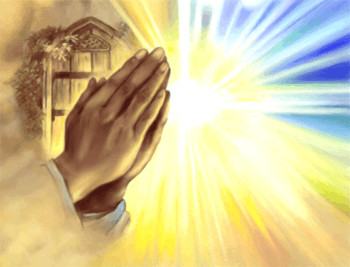
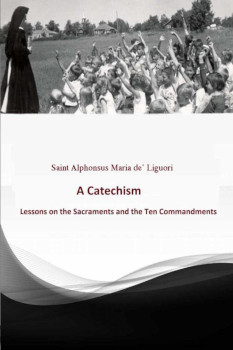 Catechism: Lessons on the Sacraments and the Ten Commandments $12.95
Catechism: Lessons on the Sacraments and the Ten Commandments $12.95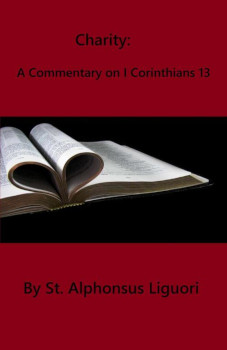 Charity: A Commentary on I Corinthians 13 $9.99
Charity: A Commentary on I Corinthians 13 $9.99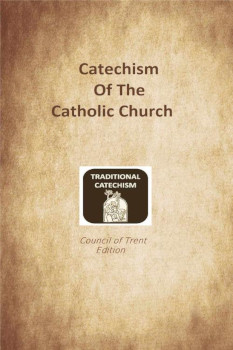 Catechism of the Catholic Church: Trent Edition $16.99
Catechism of the Catholic Church: Trent Edition $16.99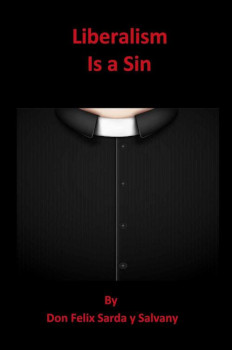 Liberalism Is a Sin $4.99
Liberalism Is a Sin $4.99



 Follow
Follow


